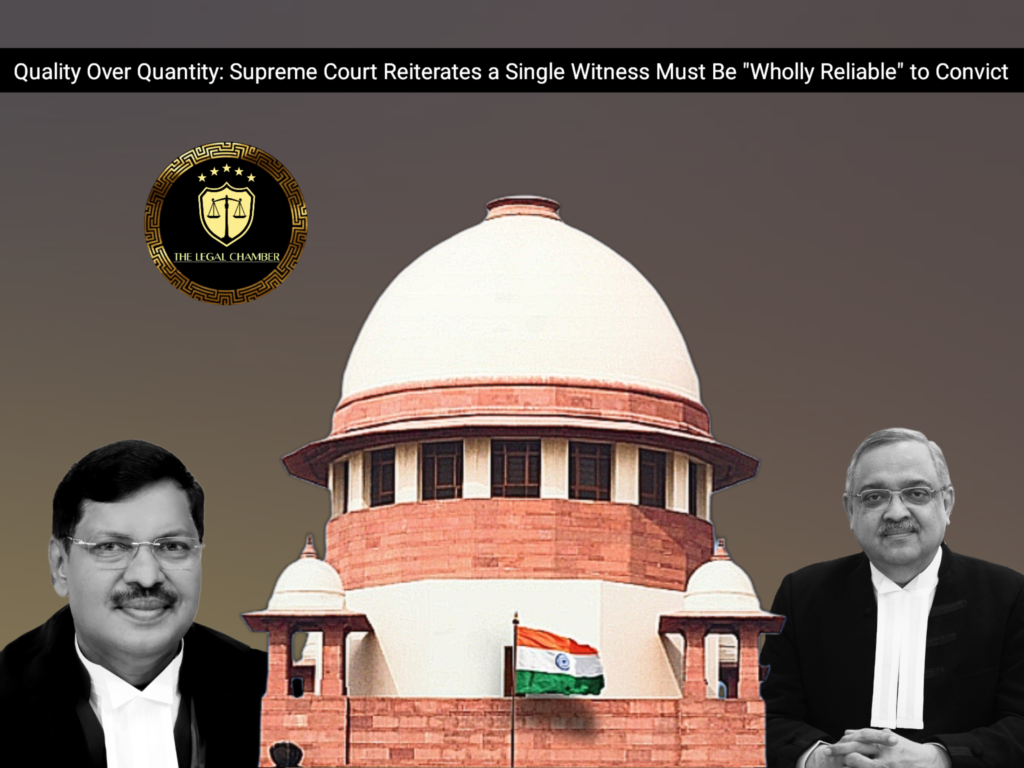
This Supreme Court judgment reiterates the established legal principle governing convictions based on circumstantial evidence, as outlined in Sharad Birdhichand Sarda. The Supreme Court held that the prosecution must establish a complete and unbroken chain of circumstances that unequivocally points to the guilt of the accused, excluding every other reasonable hypothesis. The conviction was overturned as the sole witness’s testimony was found to be unreliable and improved, failing to meet this standard of proof.
Facts Of The Case:
On October 11, 2003, Santosh Kumar Pandey (PW-2), a shop owner, observed the appellant, Shail Kumari, walking in a disordered condition towards Pujari Talab, a nearby water body, with her two young children. Growing suspicious, he asked a rickshaw puller to follow her. The rickshaw puller returned minutes later and reported that two children were floating in the water. PW-2 then saw the appellant walking towards railway tracks. He managed to drag her away just as a train was approaching. When questioned by PW-2, the appellant allegedly stated that she had killed her children due to ongoing fights with her husband, who had taken a second wife. PW-2 informed the police, leading to the registration of an FIR. The post-mortem reports confirmed the cause of death for both children was asphyxia due to drowning. The appellant was subsequently charged, tried, and convicted under Section 302 of the IPC by the Trial Court, a decision upheld by the High Court, primarily based on the testimony of PW-2.
Procedural History:
The procedural history of this case began with the conviction of the appellant, Shail Kumari, for murder under Section 302 of the IPC by the 2nd Additional Sessions Judge, Durg (Trial Court) on June 18, 2004. Her criminal appeal (No. 713 of 2004) challenging this conviction was dismissed by the Chhattisgarh High Court on September 8, 2010, which affirmed the Trial Court’s judgment and sentence. Subsequently, the appellant filed a Special Leave Petition before the Supreme Court of India, which was admitted on December 15, 2017, after condoning a delay in filing. The Supreme Court ultimately heard the criminal appeal (No. 2189 of 2017) and delivered its final judgment on August 6, 2025, allowing the appeal, acquitting the appellant, and setting aside the judgments of both lower courts.
READ ALSO:No Set Formula for Human Reaction: Supreme Court Backs Parents Who Fled Fire That Killed Kids
Court Observation:
The Supreme Court observed that the case rested entirely on circumstantial evidence and reiterated the established legal principles from Sharad Birdhichand Sarda, which require the prosecution to prove a complete chain of circumstances that unequivocally points to the guilt of the accused, excluding every other reasonable hypothesis. The Court found the testimony of the sole eyewitness (PW-2) to be wholly unreliable as it was a complete improvement over his initial police statement and contained material contradictions. With no other evidence to connect the appellant to the crime, including the non-examination of the crucial rickshaw puller witness, the Court held that the conviction was based merely on conjecture and surmises, failing to meet the standard of proof beyond reasonable doubt. Consequently, the appellant was entitled to an acquittal.
Final Decision & Judgement:
The Supreme Court allowed the appeal and set aside the impugned judgments of the High Court and the Trial Court. The Court acquitted the appellant, Shail Kumari, of all charges under Section 302 of the IPC. It ordered her immediate release from custody, provided she was not required to be detained in any other case. The Court held that the prosecution had failed to establish a complete chain of circumstantial evidence meeting the required standard of proof beyond reasonable doubt, as the sole witness’s testimony was found to be unreliable and improved. The conviction was therefore unsustainable in law.
Case Details:
Download The Judgement Here